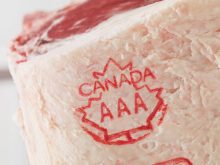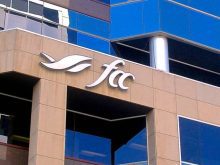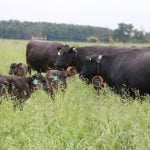The Manitoba government has announced over $150 million, linked to existing business risk management programs, to help farmers brace against the coming tariff storm.
Speaking at Maple Leaf Foods in Brandon, Premier Wab Kinew said the province has earmarked $10 million to match existing AgriStability funding, along with the $140.8 million to help cover business risk management programs such as AgriInvest, AgriInsurance and wildlife damage compensation.
“We’re making sure that farmers and producers can weather the economic uncertainty we’re facing and protecting jobs in the agricultural industry,” Kinew said.
Read Also

Trade uncertainty is back on the Canadian national menu
Even if CUSMA-compliant goods remain exempt from Trump’s new tariffs for now, trade risk for farmers has not disappeared, Sylvain Charlebois warns.
The province is working closely with Manitoba’s agriculture industry to respond to tariffs from the United States and China, he added.
Kinew further pointed to the recently unveiled 2025 Manitoba budget, which laid out another $100 million in agricultural support and tariff resilience.
The ongoing trade war has been a major topic of discussion for Manitoba farm groups, including talks between the province and the Keystone Agricultural Producers (KAP).
The province says they’ve been engaging with KAP on issues like addressing regulatory hurdles that limit growth in value-added processing, pushing Manitoba trade (including work with other provinces and key trading partner states in the U.S.) and “advocating to the federal government and working to deliver policies and investments in value-added processing, improvements to business risk management programs and access to the capital producers need.”
KAP also noted its talks with government. They hope to ensure the agriculture industry remains strong amidst tariffs and other trade uncertainties, said Colin Hornby, general manager of the commodity group.
“We’ve been working with the province. We did provide them with a list of items, priorities, and actions we would hope to see,” he said. “Hopefully, we can get them all done.”
Building on the province’s list, KAP’s goals also include working with Ottawa on policy development and investment into programs that will help producers access capital to stay competitive.
















